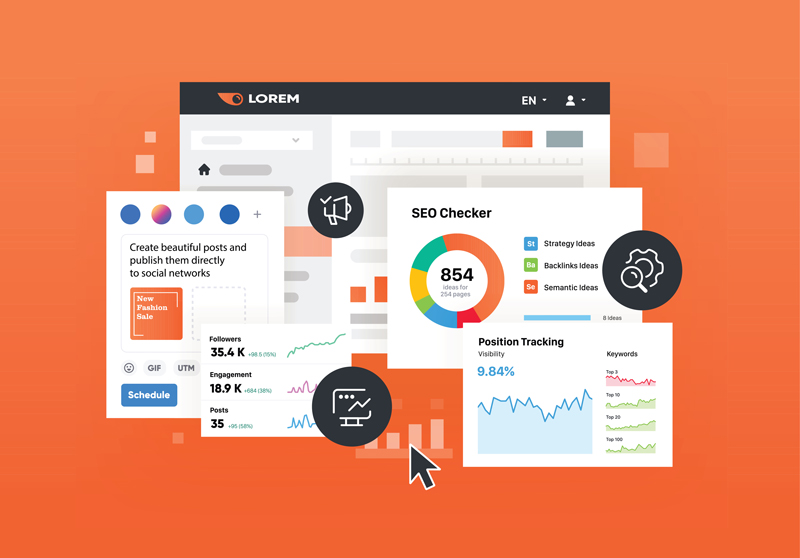
Home | Law Firm Marketing | Conversion Rate Optimization (CRO)
If you want more clients, you have to go after visibility and the way to get there is with LawSmiths.
Conversion Rate Optimization (CRO) is a transformative approach tailored to increase the online presence of law firms and, more importantly, to convert mere website visitors into clients. It involves optimizing user experience, streamlining landing pages, and employing data-driven insights to enhance conversion rates.
CRO is tailored to the legal context, where trust and credibility are paramount, ensuring that every click on a law firm’s website leads to a meaningful connection.
It is a comprehensive strategy aimed at aligning the elements of a website with the expectations and needs of potential clients. By fostering trust, providing a seamless user experience, and utilizing data to make informed decisions, CRO empowers law firms to transform their digital presence into a strong, effective lead-generation tool and increase the average conversion rate.
In a survey conducted in 2016, 68% of small businesses have no documented or structured conversion rate optimization strategy. This goes far in understanding the industry gap and how law firms can benefit from it to grow and stay ahead of their competitors.
Conversion for a law firm involves defining and refining actions that lead to meaningful interactions, such as contacting the firm, scheduling consultations, or submitting case evaluation forms. The foundation of CRO lies in optimizing the user experience (UX), recognizing its pivotal role in building trust among potential clients. A well-designed and navigable website and transparent and credible information form the cornerstone of positive user experiences and help rank better on search engines.
Data-driven decision-making is integral to CRO, as analytics tools like Google Analytics provide insights into user behavior. Leveraging tools like heat maps and user recordings allows your law firm to pinpoint areas of the website that may hinder conversions, enabling strategic improvements to your current conversion rate.
CRO extends its impact to components like landing page optimization and form streamlining. Tailoring landing pages to specific legal services, utilizing compelling headlines, customer reviews, and optimizing forms for ease of use all contribute to a more effective conversion goal.
According to statistics, top-converting companies spend at least 5% of their budget on CRO.
The continuous process of A/B testing enables law firms to refine their digital strategies iteratively. Testing different elements, from headlines to call-to-action buttons, ensures the website resonates with readers visiting your website through search engine optimization, paid ads, or other platforms.
Building credibility is a central focus of conversion rate optimization strategy for law firms, involving the strategic presentation of attorney profiles, client testimonials, and industry recognitions. Once established through the website, trust becomes a primary factor in influencing potential customers.
As the use of mobile devices continues to rise, CRO emphasizes mobile optimization. Ensuring that the website is responsive, loads quickly, and provides a seamless experience across various devices is imperative for reaching a broader audience.
Analyzing conversion funnels, from initial engagement to final conversion actions, helps law firms identify and address potential drop-off points. This strategic examination contributes to a more streamlined and effective conversion process.
Many small businesses, including law firms, lack a structured CRO strategy. However, implementing CRO can make a significant difference in the success and growth of a law firm. By optimizing the user experience, law firms can build trust with potential clients and improve their search engine rankings.
Data-driven decision-making is essential in CRO, as it allows law firms to analyze user behavior and identify areas for improvement. Tools like Google Analytics, heat maps, and user recordings can provide valuable insights into how users interact with a website and where they may encounter obstacles in the conversion process.
LawSmiths conducts detailed user research to understand your audience’s behavior, preferences, and pain points. Through surveys, analytics, and user feedback, we gather valuable insights into user expectations and tailor your website to meet their needs effectively.
A/B testing involves comparing two webpage versions to determine which performs better in terms of conversion. We experiment with variations in elements like headlines, call-to-action buttons, or images and identify the most effective elements for driving conversions.
Our agency leverages website analytics tools that provide quantitative data on user behavior. We analyze metrics like bounce rate, time on page, and conversion paths to help identify areas of improvement and inform data-driven decision-making for CRO strategies.
Landing pages play a pivotal role in conversions. LawSmiths will strategically design a landing page focusing on clarity, relevance, and a compelling call-to-action. It guides visitors seamlessly through conversion, minimizing distractions and optimizing the user journey.
We will design clear and persuasive calls to action that are fundamental for conversion. A compelling CTA prompts users to take the desired action, whether it’s a button, form, or link. We test different CTAs to ensure you find your audience’s pain points.
LawSmiths will optimize your website for mobile, which is crucial with the increasing use of mobile devices. We will focus on creating a responsive design and a seamless mobile experience that contributes significantly to CRO by accommodating users who access your site from various devices.
"*" indicates required fields

CRO is necessary for law firms because it ensures that their website attracts a substantial number of visitors and guides them through a well-optimized conversion process. In the legal industry, where credibility and trust are crucial, CRO is pivotal in fostering a positive online experience.
By strategically refining elements such as landing pages, forms, and overall website design, LawSmiths can create a digital environment for your law firm that attracts potential clients and converts them into active clients.
It could significantly enhance the user experience for your law firm website if you focus on elements that streamline navigation, provide transparent and valuable information, and build trust. In the legal industry, where potential clients seek information and assurance, a positive user experience is critical.
CRO ensures that the website’s design and content align with user expectations, making the journey from initial visit to conversion engaging and trustworthy.
Conversion optimization addresses the challenges of mobile user engagement by emphasizing mobile optimization. With the increasing use of mobile devices to access legal information and services, CRO ensures that your law firm website provides a seamless experience across various devices.
This includes optimizing mobile responsiveness, improving loading times, and ensuring all essential information is easily accessible on smaller screens. By prioritizing mobile user experience, you can engage with a broader audience.
Data-driven tools are utilized to gather insights into user behavior and inform optimization strategies. Analytics tools provide comprehensive data on website traffic, user engagement, customer surveys, and conversion rates.
Heat mapping visually depicts user engagement patterns, while user recordings offer a firsthand look at how visitors navigate the site. By using these tools, your law firm can understand user behavior deeply, allowing for informed decision-making and continuous improvement to make a positive impact on conversion rates.
CRO contributes to continuous improvement for law firms through its ongoing nature. Law firms can identify improvement areas by regularly monitoring and analyzing data from analytics tools, heatmaps, and user recordings.
Implementing changes based on these insights and continuously testing new ideas ensures the website remains dynamic, user-friendly, and aligned with evolving user behavior. This ongoing refinement process contributes to sustained improvements in conversion rates and overall online effectiveness.
Yes, it is highly adaptable and can be applied to specific legal practice areas within a law firm’s website. By tailoring optimization strategies to focus on particular services or practice areas, law firms can ensure that their website effectively converts visitors seeking specialized legal assistance.
This approach improves the relevance of the website’s content and design, increasing the likelihood of converting visitors into clients. CRO’s flexibility allows law firms to target and optimize their online presence for maximum impact within diverse practice areas.